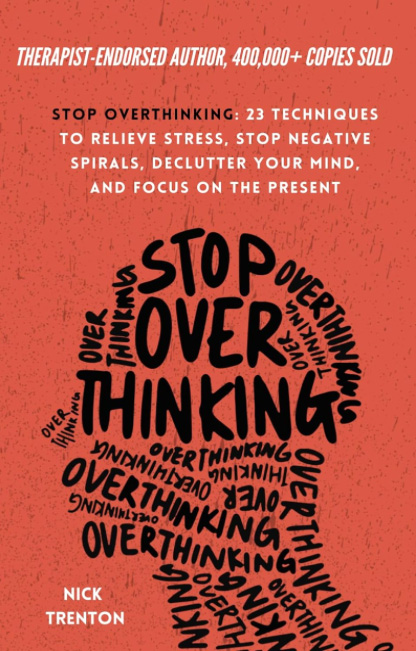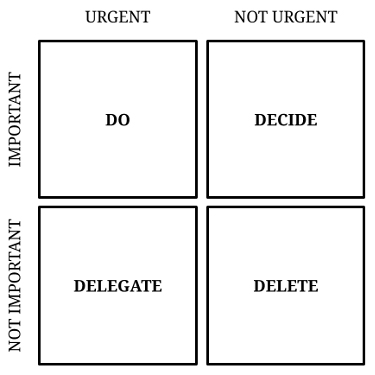INSIDER: Stop Overthinking
Do you frequently find yourself second guessing past decisions or succumbing to negative thoughts? Are you unbearably stressed or anxious over various events? If you experience any of these—and most of us do, occasionally—you may struggle with overthinking. In the book Stop Overthinking, Nick Trenton outlines several key strategies to combat stress, rumination, and overthinking.
First, we must address the root causes of overthinking. An important observation is that causes of overthinking are rarely the focus of overthinking. For example, if you often feel guilty about forgetting a friend’s birthday twenty years ago, your feelings of guilt may stem from a general sense of unworthiness, rather than the actual event. Additionally, overthinking might be a result of being overburdened with too many tasks. If you feel you have a million tasks to do, then it is no surprise that a million thoughts are running through your head.
Environmental stress and pressure become problematic only when we allow them to be. Some jobs are stressful by nature—consider firefighters, EMTs, and surgeons, who are constantly put in stressful situations. Yet, Trenton emphasizes—and the research echoes—that it’s not the size of the load, but how you carry it. Stop Overthinking includes several methods to stop overthinking. Trenton’s 23 different techniques is a bit much to examine in a short summary (and would be counterintuitive to the idea of reducing overthinking by simplifying). Thus, we have included three different methods than can help reduce stress in the moment, manage your time more effectively, and rewire your thinking to better handle stress. One point to remember is that recommendations are no substitute for professional medical advice. Some cases of overthinking may require help from a licensed professional.
THINK POINT #1: Reducing Stress in the Moment with the 5-4-3-2-1 Method
This method is designed for moments when you feel yourself spiraling or beginning to spiral, such as during anxiety attacks. First, look around and name five things that you can see. Then, listen to four different sounds. Touch three distinct objects. Inhale, and note two scents you can smell. Finally, identify a single taste. Doctors will frequently use this technique to help those who suffer from anxiety, as it physically grounds you in the environment. When you activate your senses, your mind is focused on something other than overwhelming thoughts. One note: the actual order/ number of the senses is not important, so long as you are consciously focusing on elements in your physical environment.
THINK POINT #2: Managing Time More Effectively
Sometimes it feels as if all our problems would be solved if we had a few more hours in the day. Unfortunately, that will never be the case. We have only 24 hours each day to spend however we see fit, and we often use that time to accomplish unimportant tasks. The closest we can get to gaining extra time is by learning to manage our time more effectively. One method discussed is the Eisenhower Decision Matrix. If you find yourself spending all your time ‘putting out fires’ without getting to the important or necessary work, this is an ideal method.
The Eisenhower Decision Matrix is a system that sorts tasks into a “pecking order” of sorts. The matrix is divided into four quadrants and based on urgency and importance. The first quadrant on the top left are tasks that are both urgent and important, like filing taxes or meeting with senior management at your firm. This box should be your top to “DO” priority. Next, there are important—but not urgent—tasks, usually things that have little to no consequence if not done immediately but that shift into the urgent category when not completed. Examples include working out, taking out the trash, laundry, or a project due in several weeks. Thus, we must “DECIDE” when to do these in the future. The majority of tasks, especially those that initiate the most stress, are those that are urgent, but not important. Try to avoid unnecessary tasks and commitments that do not add value to your life. These tasks ought to be “DELEGATED” to others. Finally, eliminate the tasks that aren’t urgent or important. Mindless internet scrolling, pointless TV shows, and TikTok may be fun distractions, but they do not add value, and should be “DELETED.” By using this method, you can effectively parcel up your highest priority items and make sure that what’s most important—and urgent—gets accomplished.
THINK POINT #3: Rewiring Thought Patterns
Worry has only as much power as we give it. While in some instances we should be paying full attention to our worry, such as “I hope that car barreling towards me in my lane moves over,” but often we’ll worry about things that are either unimportant or out of our control. These may include, “I wonder if that waiter liked me,” or “What if I get hit by a meteor on my way to work?” Even if either of those scenarios were the case, the first isn’t of great importance, and the second is completely out of anyone’s control. Unfortunately, while you may correctly recognize both worries as being both unimportant and uncontrollable, it often feels impossible to rid yourself of these intrusive thoughts. Fortunately, research from the University of Leiden in the Netherlands indicates that you always don’t need to eliminate worry, only postpone it. The idea is simple, acknowledge that the worry is important, and then schedule a later time to worry about it. This acknowledges that yes, your worries are important, but also that they aren’t the highest priority. At its core, worry postponement is an intentional choice to put off worrying until a more convenient time. It’s important that you not only set aside time to worry, but be productive during that time and find ways to effectively tackle these problems rather than agonize over them.
Real Estate Implications
Real estate agents and brokers frequently juggle multiple tasks and priorities. Unnecessary worrying and overthinking only adds to the stress already present in accomplishing the necessary work.
Stress and overthinking affect millions of people across America. Though the three methods above were the most effective in the author’s opinion, there are 20 other methods discussed in the book that you may find more helpful or applicable to your own life. If you find yourself frequently struggling with overthinking, Trenton’s Stop Overthinking may be a good read for you.
. . . . . . . . . . . . . . . . . . .
Recommended Reading
Trenton, Nick (2021), Book Stop Overthinking: 23 Techniques to Relieve Stress, Stop Negative Spirals, Declutter Your Mind, and Focus on the Present, Independently Published.
. . . . . . . . . . . . . . . . . . .
About the Author
Dominic Alioto, MBA Candidate
Baylor University
Dominic Alioto is currently pursuing his MBA in Healthcare Administration. He earned his BBA from Baylor University with majors in Business Fellows, International Business, and Economics, also completing the Honors Program and a minor in Mathematics. Dominic aims to work several years as a hospital executive, then return to school for a PhD in the health economics field.
. . . . . . . . . . . . . . . . . . .
Download this Article

